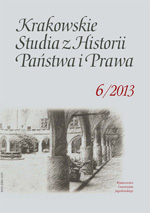Selected Administrative Principles and Their Regulation in Sapiential Literature in Ancient Egypt
Selected Administrative Principles and Their Regulation in Sapiential Literature in Ancient Egypt
Author(s): Michaela KnollováSubject(s): Law, Constitution, Jurisprudence
Published by: Wydawnictwo Uniwersytetu Jagiellońskiego
Keywords: governance; ancient Egypt; an official; principles of administration; impartiality; helpfulness; liability; predictability; timeliness
Summary/Abstract: The paper is focused on the area of Ancient Egyptian administration with an emphasis on the central person – the official. The clerical profession was considered very lucrative , the official, an educated person taking into account the illiteracy of most people, enjoyed great respect. The highest officer, being the vizier, was (in some cases) the most powerful person in the state. However, there were certain boundaries that were not supposed to be exceeded in the practice of official functions. Today we still call them the same way: “the principles of good governance”. These principles are contained in a number of documents, mostly in so-called learnings, as well as in some non-legal documents. These principles were not merely recommended behaviour patterns − those who breached them were severely punished. Upon closer examination of the principles governing official functions it becomes clear that despite the fact that many of them are centuries old they are still used today. This paper is based on religious, educational, and literary text but also on legal texts which are reactions against above mentioned situations when the principles were breached.
Journal: Krakowskie Studia z Historii Państwa i Prawa
- Issue Year: 6/2013
- Issue No: 4
- Page Range: 317-326
- Page Count: 36
- Language: English

